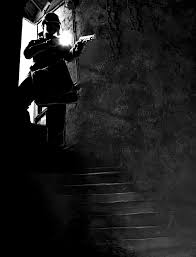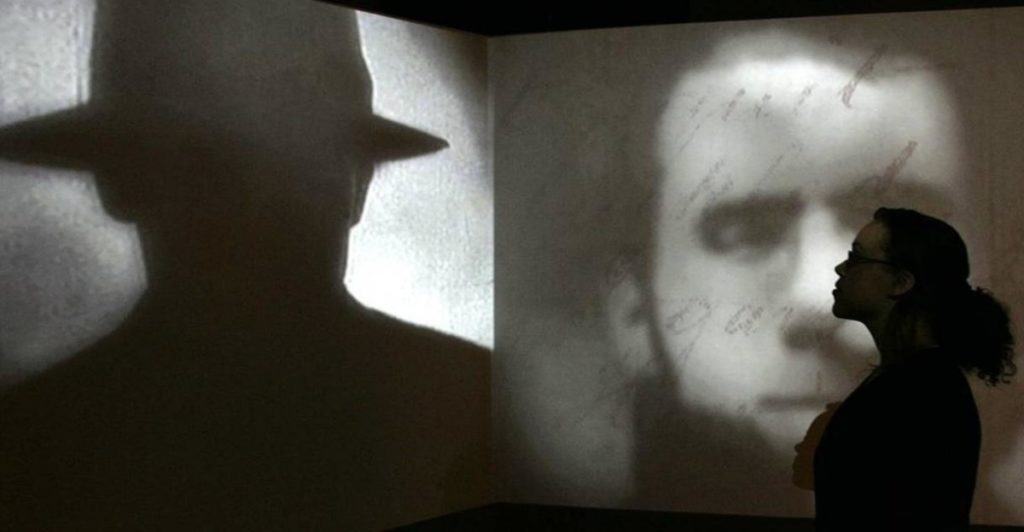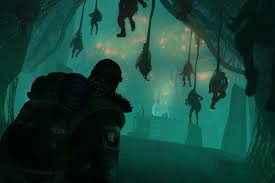Like many, my entry into the Roleplaying game hobby was through Dungeons and Dragons. After reading stories of the award-winning Dracula Dossier setting using the Gumshoe System, I decided to investigate this alternate ruleset.
The Gumshoe System brings to life the detective-noir genre by solving the problem of investigation rolls: what happens if a roll fails? Its solution is that every investigation attempt succeeds, but it becomes a question of how big of a success. No investigation depends on the roll of a dice.
Investigation scenes generate clues or leads. If your character has a relevant Investigation Skill, then they will learn at least one important clue. That clue or lead takes your character to the next scene.
But the more evidence you uncover, the more the bad guys are react to the threat your investigators are creating. Reactions by the badguys is dangerous for your investigators. But overcoming the danger leads to yet more clues.
Thus in Gumshoe, clues lead to action and action leads to clues! Also, check out my Resources Page for links to Gumshoe’s various settings and products!
Characters
As a system, Gumshoe is very different in that there is not core rule book. Its rules system is expressed in and modified by each of its setting books. While they all have a common basis, characters are expressed by their Investigation and General abilities or skills, the list of skills varies from setting to setting.
Character creation is another point-buy system where each level of a skill costs a certain number of points. While Gumshoe is not a class-based system, it does have Character Backgrounds: who were you before you became a vampire hunting super-spy (Night’s Black Agents) or a monster-hunting bureaucrat in the aftermath of the Vietnam War (Fall of Delta Green)?

Remember, the important conceit of Gumshoe games is that even new characters are not just competent, they’re specialists within their fields! Unlike some editions of Dungeons and Dragons, your characters are not fragile newbs in the field! You were selected for these top-notch organizations because of your exemplary prior service.
Again, these backgrounds are not classes. They are merely a suggested bundle of skills built around a theme or job. In Nights Black Agents (vampire hunting super spies) they include Analyst, Asset Handler, Bagman, Hacker, Wet Worker, and Wheel Artist. In Trail of Cthulhu (noir-era investigators of the unusual) they include: Archaeologist, Dilettante, Journalist, Private Investigator, and Professor.
In addition to backgrounds, your character picks a Drive. A Drive informs your character why they are putting themselves in harms way. To do so over and over again, you have to be a little crazy or obsessive. Night’s Black Agents Drives include: Atonement, Patriotism, Revenge and Slayer. Trail of Cthulhu’s includes: Adventure, Arrogance, Duty, Revenge, and Thirst for Knowledge.
To further reinforce the competency of your characters, Gumshoe has a skill (General Ability) that I had never seen in another system: Preparedness. The genius of the preparedness skill is it assumes your character planned appropriately for the mission, even though you the player did not!
If you find your team stopped by a reinforced metal door and you literally don’t have any plastic explosives written down on your character sheet to blow the door. Do not worry you have preparedness! All you have to do is ask your Game Master to let you make a “simple” Preparedness test. A success let’s you have a flashback montage where you slide a brick of C4 into your tactical vest.
I’ll explain what a simple test is in Gumshoe below when I get to Conflict & Combat. But first, let me explain Investigation Abilities and how they are used.
Investigation
Many of my examples here are from Night’s Black Agents, my favorite Gumshoe setting. While it has some specific Investigation Abilities for its setting, Vampirology, most of its abilities are shared across the various books: Accounting, Archaeology, History, Occult Studies, Cop Talk, Flattery, and Chemistry.
When you pick an Investigation Ability, you start with one rank or point in that ability. You can spend additional character points to buy up to three ranks in each Investigation ability.
As explained in the section on Investigative Abilities:
Having even 1 point in an Investigative ability indicates that you’re expertly trained, practiced, and well-read in that field. You are capable of broad leaps of intuition and brilliant insight.
Night’s Black Agents, page 10
At two or three points, you are one of the top people in your field.
When your character enters a scene, they describe to the game master the action their taking to invoke an Investigation Ability, “I sit down at the perp’s PC and hack her password to access the hard drive.” For Night’s Black Agents, that’s Data Recovery.
If the PC is protected by a simple password and that computer contains a lead or a clue, the Game Master informs the player they succeed and that they learn, “She has many photos saved of the four intersections between Franklin and Graham Streets and 3rd and 4th Avenues. You deduce her next target is somewhere on that block!”
That’s it. The player did not have to spend any resources to learn that clue. Because they have Data Recovery, we know your investigator has at least 1 point in it. The Game Master can then dangle to the player, “As you investigate the PC, you find a drive that is protected by something more than a simple password. As you analyze it, it’s a 64-bit password! Whatever is behind it, she definitely doesn’t want the common hacker to get it.”
The Game Master then tells the player that if they want to “spend” their Data Recovery point, they can break that password. However, once spent they can’t get it back until that Operation is over or the characters have an extended break to recover their wits.

In Gumshoe there are never gotcha Investigative moments between Game Master and Player. A player can only spend a point if there is something more to learn. The Game Master should always signal to the player when there is something more to learn with a spend and how many points must be spent.
Remember, your characters are hyper-competent operatives. Even if they have spent all of their Investigation Ability points, the can still keep going. They should be able to learn all of the core clues by being in the right place and simply having that Investigation Ability. They can still invoke it even if they’ve spent all of their points.
Conflict & Combat
Conflict scenes (investigation leads to danger, which leads to more investigation) are where your character uses his General Abilities. These are action-oriented skills such as, Athletics, Disguise, Explosive Devices, Health, Medic, and Shooting.
General Abilities are different than Investigation abilities in two important ways. First, there is a chance of failure when you use these abilities. Second, you can as many points in one as you want (and have the character points to spend). However, “Although there is no set cap on abilities, the second highest rating must be at least half that of the highest rating.” Night’s Black Agents, p. 11.
With that being said, a few points in, say, Shooting means you know how to chamber a round, replace a magazine, and generally shoot in the direction of your enemies. Anything up to 7 points means you’ve qualified at the range in several different firearms. At 8 points and above, you are a highly trained, special-forces level shooter.
But even a former Green Beret is known to miss her target from time-to-time. Whenever a character uses a General Ability, they roll a single six-sided die or a d6. That’s it. The Game Master sets the difficult of the roll (called a Simple Test) from anywhere between 2 and 8. However, the average or typical difficulty is set at a 4.
That means on a d6 you have a 50-50 chance of success to roll a 4 our higher (4, 5 or 6). What if you wanted to guarantee success, because you have to land a rand in the terrorists’ center of mass! Like with your Investigative Abilities, you can spend your General Ability Points.
Unlike with Investigative Abilities, you still don’t get automatic successes when you spend your General Ability Points. Instead, for each point you spend you get to add a +1 to your die roll. Your Game Master always tells you the difficulty of your attempt. If you want to guarantee your shot will hit with a 4 difficulty, then you must spend 3 Shooting points. Even if you roll a 1 on that d6, you will still have a 4.
Unlike Investigative Abilities, you can recover some of your General Ability Points mid Operation. Acting consistent with your Drive, especially at a potential cost to your mission, may allow the player to refresh a few points. Or for physical abilities, they refresh if its been 24 hours since you last invoked one in a test. Finally, if they reach a Haven (a safehouse) where they can rest and recover, a character can refresh some of her spent pools.
The different approach to character competence and skills makes Gumshoe games a refreshing change of pace from other Roleplaying Games. The adaptability over several different settings and eras makes me think about the versatility of the Savage Worlds system. But Gumshoe’s focus on the investigator-genre story telling gives it a focus that Savage Worlds sometimes lacks.
Sanity and Solace
While Gumshoe is an investigation system, most of the settings involve investigating terrible crime scenes, weird monsters, and cosmic horrors. Most characters have either sanity or stability statistic. You can use points during character creation or with experience points to raise these scores.
Each game uses Sanity as a resource differently. In Trail of Cthulhu, once it hits zero, your character is incurably insane and out of the game. But in Night’s Black Agents, it can go down to -12 before that happens.
When faced with a shocking scene, learning information that can unhinge your mind (a recurrent theme in Cthulhu Mythos games), or attempting to resist a supernatural ability requires a Sanity or Stability test. Like all tests, you can spend points to add a bonus to your roll.

In Trail, it has both Sanity and Stability. Sanity is about your exposure to the Truth of the Mythos. Stability is your ability to resist fear and maintain your poker face. Sanity is about what you believe, Stability is about how you act. NBA combines the two into Stability. Regardless, a Sanity or Stability Test creates a tension: to save your sanity you must use up a little bit of your sanity.
It is possible to regain some points of Sanity or Stability, besides spending experience points to buy it back up. In Nights Black Agents you designate three Sources of Stability: a Symbol, a Solace (person), and a Safety (place). Invoking a Source (going to your Solace) will help you regain stability. But if your enemies find and kill your Solace, then that causes a significant blow until you establish a new one.
In Trail of Cthulhu you establish Pillars of Sanity and Sources of Stablity. They operate similarly to NBA and can be a source of regaining lost points, but also a weakness that can be attacked.
Settings
I have already two of the settings that use the Gumshoe System: Trail of Cthulhu and Nights Black Agents. Remember, there is no core Gumshoe rule book. Each setting modifies, takes away, or adds to the system to emphasize that setting’s genre and themes. But they all use Investigative and General Abilities, a d6 for tests, and sanity as a resource.
Trail of Cthulhu: Set in the early 1900s, your characters are investigating strange cults, weird occurrences, and weird objects. In many ways, Trail is Kenneth Hite’s (he is the author of several of Gumshoe Settings) love letter to the Call of Cthulhu RPG.
There are many different archetypes you can base your characters upon including: Alienist (late 19th Century shrink), Author, Clergy, Doctor, Hobo, Private Investigator or Scientist. The Investigative Abilities are all era-specific, but also include Cthulhu Mythos which typically can only be gained through the course of play.
However, invoking Cthulhu Mythos Investigative Ability always risks losing Stability and, if what you learn is terrible enough, Sanity. Once again, sometimes you must use the tool of the Enemy to stop the Enemy, but it may cause you to become the Enemy.
Like in Call of Cthulhu, your characters are investigators first and foremost. Sometimes you face danger from crazy cultists who are only human. But most investigators are likely to lose stand-up fights with inhuman foes.
To get a feel for the setting, I suggest reading the original Call of Cthulhu, Shadow over Innsmouth, or the Dunwich Horror. Film and TV adaptation has been inconsistent, but the first season of True Detective is recommended.
Nights Black Agents: Set in the 2000s, you play secret agents (think Jason Bourne) who discover the existence and threat of vampires. You use your considerable investigative and field skills to find out who is helping the vampires, their goals, and then stopping them.
While early in the investigation your agents may be overmatched by vampires, you will become not only vampire hunters but killers. This fact distinguishes NBA characters from Trail characters.
As secret agents and special forces operatives, you have different archetypes or backgrounds to choose from. In fact, you’re encouraged to pick two different archetypes to round out the skills of your team. Those include, Analyst, Bagman, Cleaner, Hacker, Wet Worker, and Wheel Artist.
As is appropriate, the Investigative Abilities are period-appropriate and genre-appropriate. NBA’s version of Cthulhu Mythos is Vampirology, which is generally not a starting ability. Unlike Cthulhu Mythos, invoking Vampirology does not come at the cost of your Stability.
Another Investigative Ability of Note is Urban Survival. it is your ability to get around, spot patterns, and know where things are in a city. But with each level you can also pick a specific Familiar City, like London or Prague. When in one of those cities, you just know more about its dark corners and people. As with Preparedness, you can wait to specify the city until you’re on a mission and need it.
In the General Ability category, Nights Black Agents has the Networking Ability. This represents your network of contacts and sources throughout the world. Each contact may have a specific Ability that you can invoke by making a Network spend.
For example, you are in Prague and you need some Holy Water for your next mission. Your team has used all of their Preparedness points for other supplies. You say to the Game Master that you know a priest in Prague, Father Sasha, who might be able to get some Holy Water.
By spending your Networking points, you are giving that contact points in either an Investigative or General Ability. If you want to guarantee Father Sasha has Holy Water, then you’ll need to spend three points of Networking to give him three points of Preparedness. You then spend those points to add +3 to your test roll. You can always refresh your Contact with another Networking spend.
But if your contact uses up all their assigned points, then they may be exposed in someway to your enemies. The next time you visit Father Sasha, he may have been compromised or turned by the Vampire conspiracy. As you can see, I really love Nights Black Agents.
Esoterrorists: This setting has elements of Trail and NBA, you are investigators attempting to uncover and stop a terrorists trying to rip apart the fabric of the world and reality. Your characters are members of the Ordo Veritatis a benevolent secret organization trying to maintain reality.
Fall of Delta Green: What if the US Government discovered the existence of the Cthulhu Mythos and the dangers it poses? One part of the government would create a secret agency, Delta Green, whose job is to fight and destroy this danger. However, another part of the government, Operation Majestic, wants to research and weaponize the secrets of the Mythos to expand US power and prestige.
Set in the 1960s, your characters must not only fight the Mythos, but parts of their own government. This setting combines the X-Files with Vietnam War movies.
If you want to check out more of the Gumshoe RPG products directly, please go to my Resources Page for links to their various settings and products!
If you want to explore the wilder (and wider) world of tabletop roleplaying games go there! If you want to start to learn on how to paint miniatures, click already! Or maybe you want to read more of my posts about Dungeons and Dragons, then click away here!

